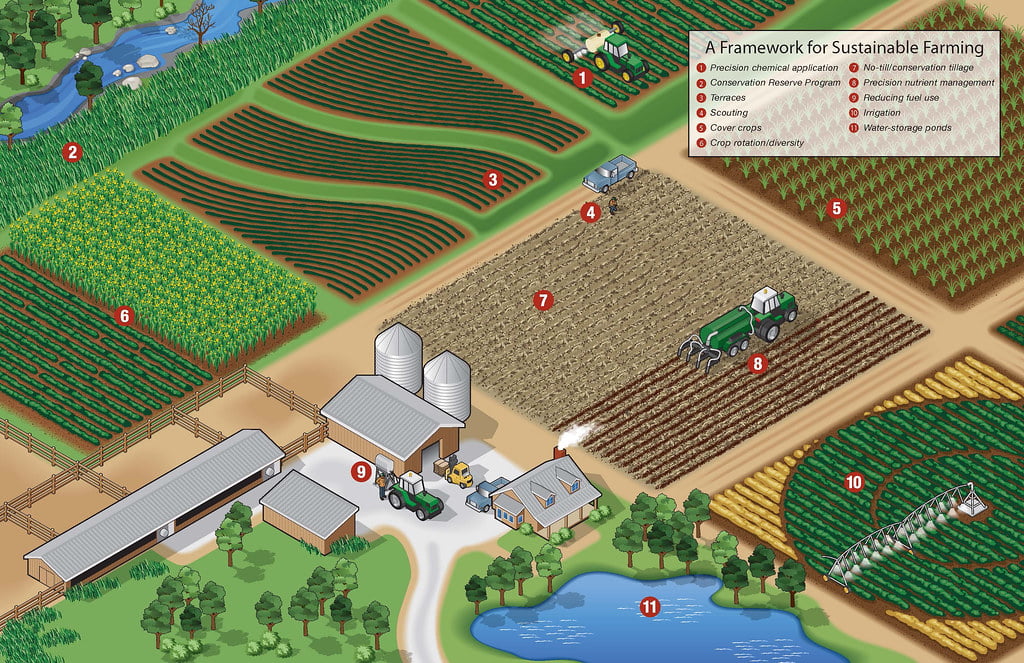Most modern agricultural practices focus on high yields and short-term profits, often at the expense of the environment and long-term sustainability. Sustainable farming, on the other hand, offers a more environmentally friendly and ethical approach to food production. By prioritizing soil health, biodiversity, and natural resource conservation, sustainable farming not only protects the land but also ensures the long-term viability of our food system. In this blog post, we will explore the numerous benefits of sustainable farming in agriculture and why it is crucial for the future of our planet.
Key Takeaways:
- Improved Soil Health: Sustainable farming practices help maintain and improve soil health by reducing erosion, promoting soil fertility, and increasing organic matter content.
- Environmentally Friendly: Sustainable farming methods reduce the environmental impact of agriculture by minimizing chemical inputs, conserving water resources, and protecting biodiversity.
- Long-Term Viability: Adopting sustainable farming practices can lead to increased resilience to climate change, reduced production costs, and long-term economic viability for farmers.
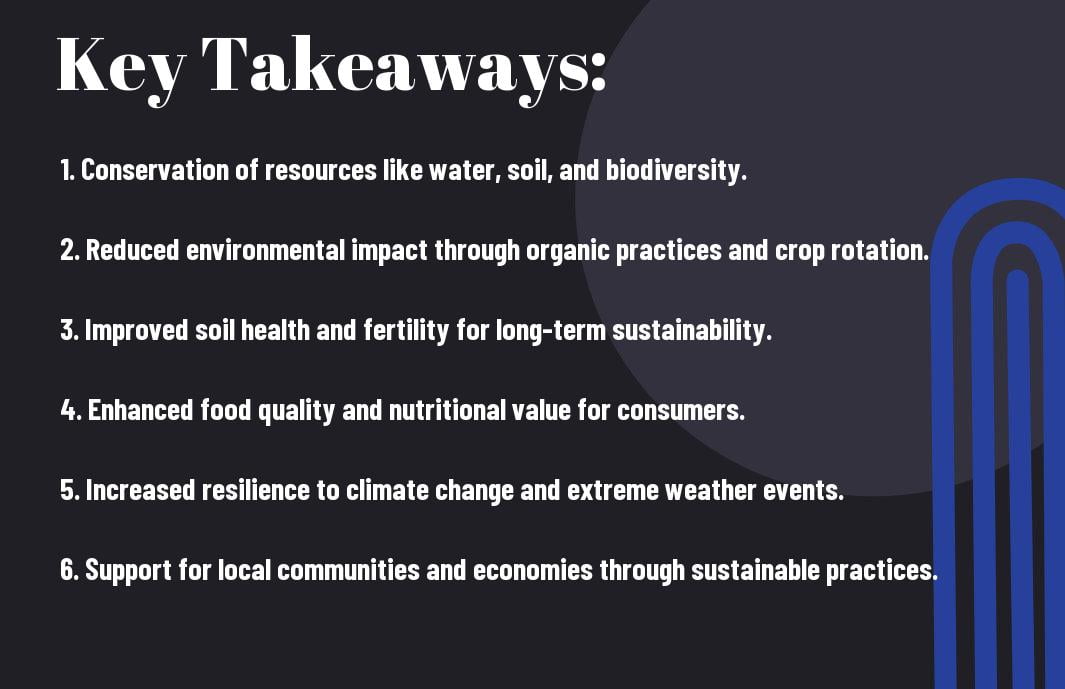
Principles of Sustainable Farming
Crop Diversity and Rotation
One of the key principles of sustainable farming is crop diversity and rotation. Planting a variety of crops helps to maintain soil health, prevent pest and disease outbreaks, and improve overall crop yield. By rotating crops seasonally, farmers can reduce the depletion of nutrients in the soil and minimize the need for synthetic fertilizers. This practice also helps in breaking the cycle of pests and diseases that target specific crops, promoting a more balanced ecosystem on the farm.
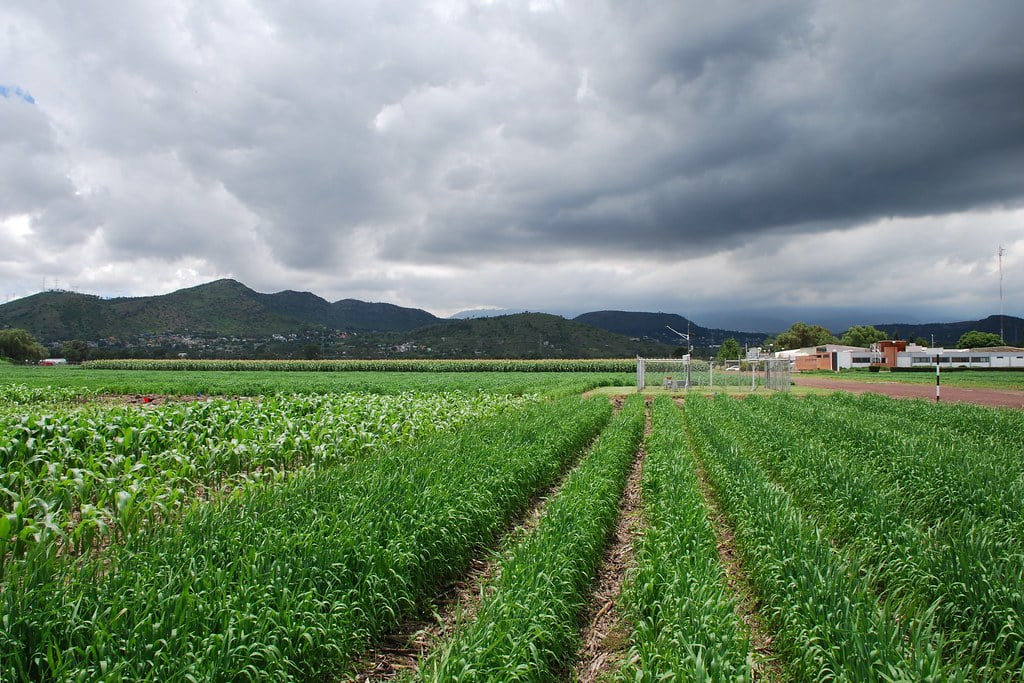
Soil Management and Conservation
One necessary aspect of sustainable farming is proper soil management and conservation techniques. Farmers are encouraged to use practices such as minimal tillage, cover cropping, and mulching to protect the soil from erosion and maintain its fertility. These methods not only improve soil structure and water retention but also enhance the biodiversity of soil organisms, leading to a healthier and more resilient farm ecosystem.
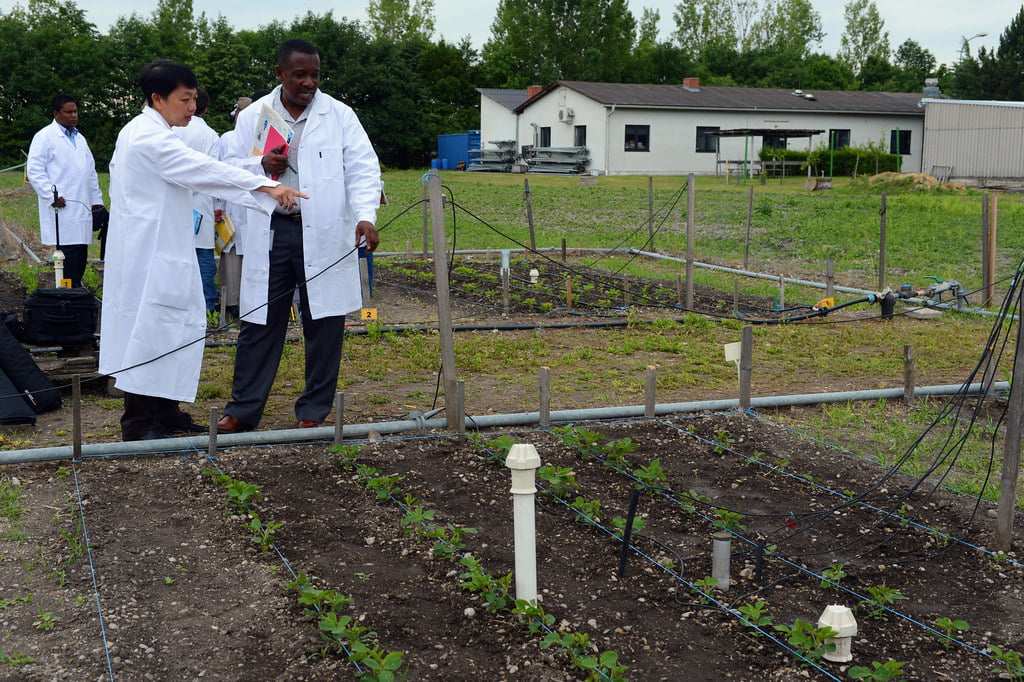
An example of soil management and conservation in action is the use of cover crops during fallow periods to prevent soil erosion and nutrient loss. This practice also helps in weed suppression and enhances soil microbial activity, promoting long-term soil health and productivity.
Economic Benefits of Sustainable Farming
Cost Savings and Profitability
Unlike conventional farming methods, sustainable farming practices prioritize efficiency and resource utilization. One of the key economic benefits of sustainable farming is the significant cost savings it offers farmers. By reducing reliance on expensive chemical fertilizers and pesticides, sustainable farming helps farmers cut down on input costs. Additionally, practices such as crop rotation and integrated pest management contribute to higher yields and lower production expenses.
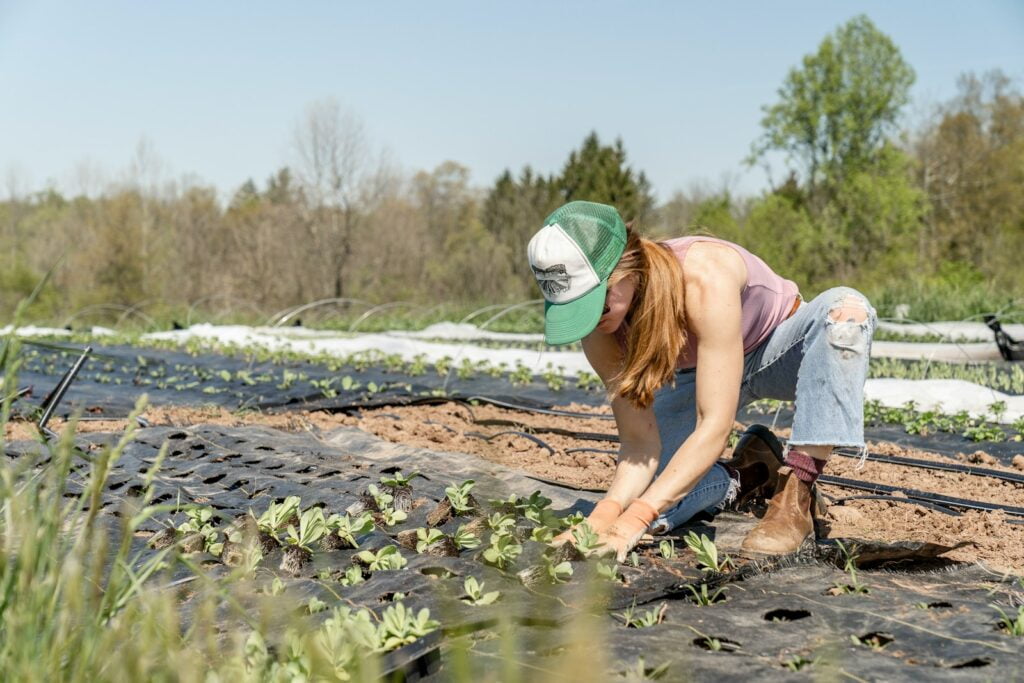
Moreover, sustainable farming enhances profitability by creating market opportunities for organic and sustainably produced goods. Consumers are increasingly willing to pay a premium for products that are ethically sourced and environmentally friendly. By adopting sustainable practices, farmers can tap into this growing market demand and potentially earn higher prices for their produce.
Long-term Financial Security for Farmers
With the unpredictable challenges posed by climate change and market fluctuations, sustainable farming offers a pathway to long-term financial security for farmers. By building healthy soil through practices like cover cropping and conservation tillage, farmers can improve their resilience to extreme weather events and reduce the risk of crop failures. This stability can help farmers secure their income and livelihoods over the long term.
Any investment made in sustainable farming practices not only benefits the environment but also ensures the economic sustainability of farms for future generations. By preserving natural resources and adopting regenerative agricultural techniques, farmers can create a legacy of financial stability and environmental stewardship.
Environmental Benefits of Sustainable Farming
Not only does sustainable farming provide economic benefits to farmers, but it also offers several environmental advantages that are crucial for the long-term health of our planet.
Reducing Greenhouse Gas Emissions
On a global scale, agriculture is a significant contributor to greenhouse gas emissions, primarily through the use of synthetic fertilizers, livestock methane production, and machinery operations. However, sustainable farming practices such as crop rotation, cover cropping, and agroforestry can dramatically reduce these emissions. By sequestering carbon in the soil, sustainable farming helps mitigate climate change and promotes soil health.
In addition, agroecological approaches like integrated pest management and precision agriculture minimize the use of chemical inputs, further decreasing the carbon footprint of farming operations. By adopting sustainable practices, farmers can play a vital role in combating climate change and preserving the environment for future generations.
Enhancing Biodiversity and Ecosystem Health
Benefits of enhancing biodiversity and ecosystem health through sustainable farming practices are manifold. Diverse crop rotations, intercropping, and the preservation of natural habitats on farms contribute to the proliferation of beneficial insects, birds, and soil microorganisms. This not only enhances natural pest control but also promotes a more resilient ecosystem that can adapt to environmental changes.

To further protect and enhance biodiversity, sustainable farmers often create wildlife corridors, plant hedgerows, and incorporate agroforestry systems. These practices provide habitat for a variety of species, restore ecological balance, and increase overall farm productivity through natural ecosystem services.
Social and Community Advantages
Improving Food Security and Nutrition
To address the issue of food security and nutrition, sustainable farming practices play a crucial role. By implementing sustainable agricultural methods such as crop rotation, organic fertilizers, and integrated pest management, farmers can improve soil health and increase crop yields. This not only ensures a more stable food supply but also enhances the nutritional value of the produce grown. By growing a variety of crops and avoiding monocultures, sustainable farms can provide a diverse range of nutrients to the local community, promoting better overall health.
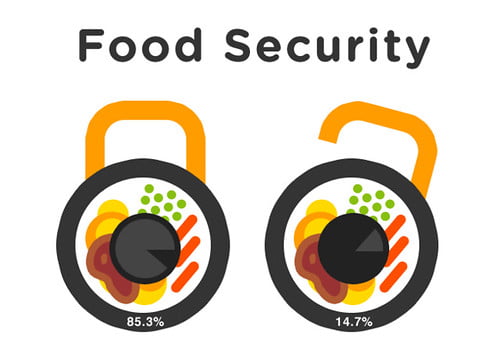
Supporting Local Economies and Livelihoods
Community-focused sustainable farming practices can create economic opportunities for local farmers and workers. By sourcing inputs locally and selling produce directly to nearby markets, sustainable farms help support local economies. Additionally, by reducing reliance on expensive synthetic inputs and focusing on cost-effective and environmentally friendly methods, farmers can improve their livelihoods and financial stability. This not only benefits the farmers directly involved but also contributes to the overall economic resilience of the community.
Community-supported agriculture (CSA) is an excellent example of how sustainable farming can support local economies and livelihoods. By establishing direct relationships between farmers and consumers, CSAs promote transparency and trust in the food system. Consumers benefit from fresh, locally grown produce, while farmers receive fair compensation for their efforts. This direct connection fosters a sense of community and encourages sustainable farming practices that benefit everyone involved.
Nutrition: Emphasizing the importance of consuming locally grown, diverse, and nutrient-rich foods is imperative for improving public health and well-being. By supporting sustainable farming practices that prioritize the nutritional quality of produce, communities can combat malnutrition and diet-related illnesses. This shift towards a more wholesome and sustainable food system not only benefits individual health but also strengthens the social fabric of the community.
Policy and Implementation
Once again, policy and implementation play a crucial role in promoting sustainable farming practices in agriculture. It is necessary for governments to set clear guidelines and provide support to farmers to adopt environmentally friendly methods.
Government Incentives for Sustainable Practices
Sustainable farming practices can be encouraged through government incentives such as subsidies, tax breaks, and grants for farmers who implement sustainable techniques. By providing financial support, governments can motivate farmers to invest in eco-friendly practices that promote soil health, conserve water, and reduce pollution.
Furthermore, policies can be put in place to regulate harmful farming practices and promote sustainable alternatives. By enforcing regulations and offering incentives, governments can create a conducive environment for the adoption of sustainable agriculture.
Educating Farmers and the Community
For a successful transition to sustainable farming practices, education is key. Farmers and the community must be educated about the benefits of sustainable agriculture, the negative impacts of conventional farming methods, and the various techniques available to improve sustainability.

Plus, education can help dispel myths and misconceptions surrounding sustainable farming, empowering farmers to make informed decisions that benefit both the environment and their livelihoods.
Challenges and Future Perspectives
Overcoming Barriers to Adoption
Keep in mind that despite the numerous benefits of sustainable farming, there are challenges that farmers may face when transitioning to these practices. One major barrier is the initial investment required to adopt sustainable techniques, which can be daunting for small-scale farmers with limited resources. Additionally, there may be a lack of knowledge and expertise in sustainable farming methods, making it crucial to provide training and support to facilitate the adoption process.
Another challenge is the resistance to change within the farming community. Farmers may be hesitant to switch to sustainable practices if they perceive them to be less profitable or more labor-intensive. It is important to demonstrate to farmers that sustainable farming can lead to long-term benefits, such as improved soil health, increased biodiversity, and resilience to climate change.
The Role of Technology and Innovation in Sustainable Farming
Innovation plays a vital role in overcoming challenges and driving the adoption of sustainable farming practices. An increasing number of technologies are being developed to support sustainable agriculture, such as precision farming tools, drones for monitoring crops, and soil sensors for improved resource management. These innovations can help farmers optimize their operations, reduce inputs, and enhance overall efficiency.
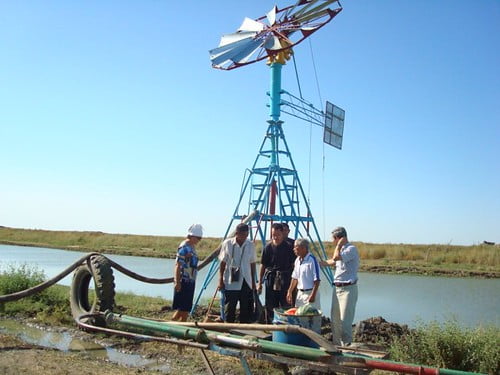
Furthermore, collaborations between researchers, farmers, and technology developers are important to advancing sustainable agriculture. By sharing knowledge and resources, stakeholders can collectively work towards developing and implementing innovative solutions that promote sustainable farming practices.
For instance, the use of data analytics and artificial intelligence can provide valuable insights for farmers to make informed decisions about crop management, pest control, and resource utilization. By leveraging these technological advancements, farmers can enhance productivity while minimizing environmental impact, ultimately leading to a more sustainable agricultural..
Conclusion
Upon reflecting on the benefits of sustainable farming in agriculture, it is evident that adopting such practices is crucial for the future of our food production systems and the health of our environment. Sustainable farming methods not only promote long-term soil health, water conservation, and biodiversity but also contribute to mitigating climate change. By reducing the use of synthetic inputs and promoting natural pest control methods, sustainable farming creates healthier produce while minimizing environmental impact. It is imperative that farmers and policymakers continue to prioritize sustainability in agriculture to ensure a resilient and sustainable food system for generations to come.
FAQ
Q: What is sustainable farming in agriculture?
A: Sustainable farming in agriculture is a method of cultivating crops and raising livestock that focuses on preserving the environment, protecting natural resources, and promoting economic viability for farmers. It involves practices that are environmentally friendly, such as crop rotation, organic farming, and integrated pest management.
Q: What are the benefits of sustainable farming in agriculture?
A: Sustainable farming in agriculture offers numerous benefits, including reduced environmental impact, improved soil health, conservation of water resources, increased biodiversity, and protection of ecosystems. It also helps mitigate climate change by reducing greenhouse gas emissions and promotes the well-being of farm workers and local communities.
Q: How can farmers transition to sustainable farming practices?
A: Farmers can transition to sustainable farming practices by incorporating techniques such as conservation tillage, agroforestry, cover cropping, and rotational grazing. They can also adopt organic farming methods, use natural fertilizers and pesticides, and implement water-saving irrigation systems. Collaborating with agricultural experts, participating in training programs, and seeking financial support for sustainable projects can also help farmers make the transition successfully.

